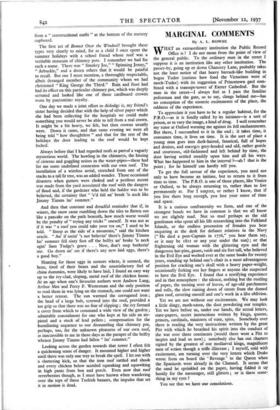MARGINAL COMMENTS
By A. L. ROWSE
WHAT an extraordinary institution the Public Record Office is ! I do not mean from the point of view of the general public. To the ordinary man in the street I suppose it is an institution like any other institution. The passer-by, going up or down Chancery Lane, probably takes not the least notice of that heavy barrack-like building in bogus Tudor (curious how fond the Victorians were of mock-Tudor) with its suggestion of Princetown gaol com- bined with a transept-tower of Exeter Cathedral. But the man in the street—I always feel as I pass the familiar policeman and the gate, so to say, clangs behind me—has no conception of the esoteric excitements of the place, the oddness of the experience.
To appreciate it you have to be a regular habitue, for the P.R.O.—as it is fondly called by its initiates—is a sort of prison, or to vary the image, a kind of drug. I well remember my tutor at Oxford warning me against its fell enchantments. But there, I succumbed to it in the end ; it takes time, it consumes time, it lives on time. It is the sort of place a young man goes into dark-haired, fanatical, full of hopes and desires, and emerges grey-headed and old, rather gentle and courteous, old-fashioned and left behind by time, the dust having settled steadily upon him and all his ways. What has happened to him in the interval ?—ah ! that is the point ; for he himself can hardly tell you.
To get the full savour of the experience, you need not only to have become an initiate, but to return to it from time to time. The P.R.O. is one of those places, like Venice or Oxford, to be always returning to, rather than to live permanently at. For I suspect, or rather I know, that if you live there long enough, you lose your sense of time and space.
It is a curious confraternity we form, and one of the strongest bonds we have in common is that we all know we are slightly mad. Not so mad perhaps as the old gentleman who spent all his life researching into the Falkland Islands, or the endless procession of females you hear enquiring at the desk for defunct relatives in the Navy (" He died a post-Captain in 1776," you hear them say, or it may be 1811 or any year under the sun) ; or that frightening old woman with the glittering eyes and the dangerous hat-pins, gaunt, raide and six feet tall, who believed in the Evil Eye and worked ever at the same books for twenty years, standing up behind one's chair in a most advantageous position for cracking one's skull with a heavy paper-weight, occasionally forking out her fingers at anyone she suspected to have the Evil Eye. I found that a terrifying experience and in that atmosphere : the silence, nothing but the rustling of paper, the turning over of leaves, of age-old parchments and rolls, the slow raining down of smuts from the domed glass roof, covering oneself and one's work in a like oblivion.
Yet we are not without our excitements. We may look a little dingy, moth-eaten, the dust powdering our temples. Yet we have before us, under our hands, the actual letters, state-papers, secret instructions written by kings, queens, princes, cardinals, ministers of state, spies. Somebody over there is reading the very instructions written by the great Pitt with which he breathed his spirit into the conduct of the war over three continents (would there were a Pitt to inspire and lead us now) ; somebody else has out charters signed by the greatest of our mediaeval kings, magnificent men of action though a trifle illiterate ; I myself, cold with excitement, am turning over the very letters which Drake wrote from on board the ' Revenge ' to the Queen when the Spaniards were already in the Channel It seems that the sand he sprinkled on the paper, having folded it up hastily for the messenger, still glitters ; or is there some- thing in my eyes ?
You see that we have our consolations.














































 Previous page
Previous page